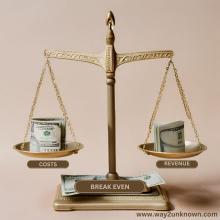Break even

"Break even" refers to a financial concept where a business or project neither makes a profit nor incurs a loss. It represents the point at which total revenue equals total costs, resulting in zero net income. In simpler terms, it's the point at which a business covers all its expenses but hasn't yet generated any profit. Determining the break-even point is crucial for businesses as it provides insights into the minimum level of sales or activity required to avoid losses and start making a profit.
To calculate the break-even point, businesses typically consider both fixed costs (costs that remain constant regardless of production or sales volume, such as rent, salaries, and utilities) and variable costs (costs that fluctuate with production or sales volume, such as raw materials and sales commissions). By dividing total fixed costs by the contribution margin per unit (selling price per unit minus variable cost per unit), businesses can determine the number of units they need to sell to cover their expenses. Once this point is reached, any additional sales beyond the break-even point contribute to profit. The break-even analysis is a fundamental tool in financial planning and decision-making, helping businesses set pricing strategies, assess risk, and evaluate the feasibility of new ventures.